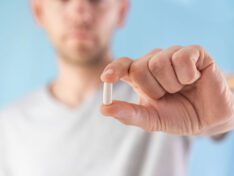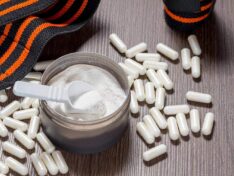What Natural Supplements Help with Brain Fog and Mental Fatigue?
Whether stress, insomnia, or being immune deficient, having brain fog is a sure sign that something is not right in your body. Research shows, the supplements mentioned here can have a significant impact on your mental health.

Have you ever had the experience of sitting at your desk trying to write up a report or explain something complicated in an email, and you realize that you've been staring blankly at your screen without even noticing? Or maybe while you're reading?
It happens to the best of us, and it's something that I've struggled with on and off over the years.
Brain fog is a non-medical term often used to describe mental fatigue, the inability to concentrate, the struggle to think straight, recall memories, or make even the smallest decision.
Other people describe having a head filled with cotton rather than an active, intuitive, life-filled brain.
For me, where I've been noticing it is when I sit down to catch up on my emails, and I can't seem to find the right words, and sometimes my inbox feels so overwhelming that I close everything down and take a break.
It's caused by several factors, so to determine what natural supplements will help you, it's important to look at the underlying causes.
I will cover some of the more common issues related to lifestyle. Still, it can be linked to serious conditions such as Alzheimer's and Parkinson's Disease, so if you are concerned about your symptoms, it's best to get a professional medical opinion.
If you've been struggling to remain calm, level-headed, optimistic, or productive, and you want answers and solutions, keep reading!
1. Sickness
Something as simple as a routine cold can impact your cognitive processes (not to mention a more serious dose of flu), and immune-boosting supplements can help.
Remember when you booked yourself off work and climbed back into bed with blocked sinuses and a fever? There's a good chance that you weren't thinking clearly, and even the effort of responding to a text might have been too much.
But, if you could restore your body's immunity, you could reduce the likelihood of getting sick, thereby boosting your ability to think and reason well (with the added benefit of feeling at the top of your game).
Top Immune-Boosting Supplements:
Vitamin C
Any list of immunity vitamins wouldn't be complete without Vitamin C.
If your levels of vitamin C are low, you increase your chance of getting sick. Unfortunately, it's not something your body can produce by itself or store, so you need to be topping up daily.
If you're not getting enough vitamin C through fruits and vegetables, a vitamin C supplement can make sure that your immunity level stays at a constant level.
As for which vitamin C supplement is best? Look for buffered Vitamin C.
Zinc
Zinc is one of the vitamins that doesn't get much coverage, but it's essential for supporting the body's natural resistance. It also has a vital role to play in carbohydrate metabolism, glucose utilization, and insulin production, as well as most of the body's other metabolic processes.
It's included in most multivitamins but can be taken alone as a dietary supplement.
Vitamin B6
Vitamin B6 is involved in over 100 metabolic enzyme processes in the body and is vital to proper immune function. It's found in most multivitamin supplements as part of the B-complex vitamin, or you might see it on the ingredient list as pyridoxine hydrochloride.
B6 is included in most immune-boosting and many other supplements to help absorption.
2. Sleeplessness
Sleeplessness can be an ongoing issue, or it may be linked to a short-term stressor, such as a job interview or after an argument with your partner.
If you notice an ongoing inability to get to sleep or stay asleep, you could have insomnia, which can negatively impact your life in various, often subtle ways. The condition may leave you feeling sleepy during the daytime, lethargic, sick, prone to mood swings, increased irritability and anxiety, and the inability to 'think straight.'

The link between sleep and cognitive function is well-documented, with one study showing its ability to impact cognition, productivity, performance and concentration, problem-solving, and memory performance.
You also need sleep to prevent obesity, maximize athletic performance, guard against strokes and heart disease, as well as improve mood and immune function.
While several lifestyle factors should be addressed, including the incorporation of a good before-bed routine, one of the best ways to tackle sleeplessness and insomnia is with natural supplements.
Top Sleep-Enhancing Supplements:
Melatonin
Ask anyone who's ever had insomnia, and one of the first things they'll mention is melatonin.
It's produced naturally by the body to signal to the brain that it's time for bed by rising in the evening and dropping in the morning. It can be a helpful supplement if your sleep has been disrupted due to jet lag or if you're a shift worker needing to sleep during the day. It's also proven helpful for those with sleep disorders, reducing the time that it takes to fall asleep as well as increasing the total amount of time spent sleeping.
Magnesium
Magnesium works with melatonin by regulating its production and increasing levels of gamma-aminobutyric acid, known for its calming effects. It is also linked to calming the mind and body, making it easier to fall asleep. Increasing magnesium intake with natural supplements can improve the quality and quantity of your sleep, especially if you are older with lower levels of magnesium.
In addition to improving sleep quality, magnesium is involved in hundreds of other processes in the body, many of which are related to brain and heart health.
However, you want to look for very high-quality magnesium. And, definitely make sure to stay away from magnesium oxide, as it will only give you the runs.
3. Nutritional Deficiencies
If your body isn't getting the fuel it needs to perform well, you'll notice that your brain feels a bit sluggish (and often, your body will too).
The temptation is often to grab a sugary snack and a cup of coffee to give yourself a boost, but if you take a look at what recent studies show us, you'll quickly see that there's a better way to lift the fog.
In fact, people who eat a standard American diet high in processed fats are much more likely to develop depression, which is linked to brain fog (which we'll cover in more detail in the point below).
It's a vicious cycle; you're tired, so you eat a sugary snack, which spikes your blood sugar levels, making you irritable and your brain foggy, and shortly after, when your blood sugar level crashes, you feel anxious, more tired, and moody. This means you are more likely to eat another sugary snack, and so the cycle continues. Additionally, if it's a wheat-based snack (like a donut or muffin), it will be even worse.
The first prize is to eat a diet that includes complex carbohydrates, protein, and healthy fats, which means you'll have to ditch the simple carbohydrates. Seriously, stay away from the sugar!
In our fast-paced world, this isn't always going to be possible, or maybe you're already eating well, have reduced your sugar consumption, and are focusing on eating healthy fats, but your brain is still feeling fuzzy. That's where vitamin supplements can really help.
Top Supplements to Correct Nutritional Deficiencies:
Vitamin B12
This powerhouse vitamin is vital for protecting against mental and neurological disorders, especially if you are older (and have poor nutrient absorption), have reduced your consumption of meat (as in the case of vegans and vegetarians), or take acid-suppressing medications.
It's estimated that around 1 to 15% of adults are vitamin B12 deficient.
Vitamin D
Linked to improved mood and mental function, lack of vitamin D is a common nutritional deficiency and affects an estimated 1 billion people worldwide. Sun is the best source of vitamin D, but for older people or those living in cooler climates, a vitamin D supplement will make a big difference.
Omega-3 Essential Fatty Acids
These are found in high concentrations in the brain and are essential to memory, brain health, and cognitive function, but it's notoriously difficult to get enough through diet alone.
Wild-caught fatty fish is the best source, but if that's not realistic, then an omega-3 supplement can help.
To get the best results, choose one that has a high concentration of DHA (docosahexaenoic acid), the fatty acid that has the most benefits for the brain, particularly the cerebral cortex, which is associated with creativity, attention, language, memory, and more.
This is one supplement I consider a must-have for everyone -- even if you don't have brain fog.
A high-quality EPA-DHA supplement is what you want.
4. Stress
Always a pertinent topic (affecting an estimated 80% of Americans), stress and the conditions that it triggers, such as anxiety and depression, can be managed to an extent by diet, exercise, and other lifestyle factors.

Many people seem to prize their stress level, and it's often equated with success and productivity. But actually, it's one of the biggest risk factors for developing brain diseases such as Alzheimer's and dementia. It's also a trigger for brain fog, as it leads to anxiety and depression, poor decision-making, and memory loss.
When we get stressed, our body releases cortisol, an appropriate response to a stressful situation. Too much cortisol leads to a surplus of free radicals that damages your brain cell membranes, causing impaired function and death. It also prevents the creation of new brain cells.
Of course, we need to make changes to our lifestyles if we're living with chronic stress, but there are also natural supplementation options that can have a profound effect.
Top Stress-Relieving Supplements:
Rhodiola Rosea
Stress-related burnout and chronic fatigue (both of which have the symptoms of brain fog) can be successfully treated with Rhodiola, a non-toxic herb native to Russia and Asia. The herb stimulates the body's natural stress response and improves sleep quality, short-term memory and concentration, and anxiety.
Probiotics
This could be something you haven't thought of, but cognitive function and mood are linked to gut health, and probiotics can help with both.
New research is showing the important role that the gut has to play in brain function (so much so that it's been dubbed the 'second brain'). Your gut produces neurotransmitters like the brain does, including serotonin (possibly up to 90% is made in the digestive tract), dopamine, and gamma-aminobutyric acid.
One study found that probiotics boost mood and cognitive function, lowering stress and anxiety. At the same time, another showed that probiotics were linked to lower stress and increased brain activity.
5. Brain Health
To keep your brain functioning optimally as you get older and to protect against brain-related conditions such as Alzheimer's disease, there are several different supplements that you can take that have been linked to helping you feel more alert and less tired as well as reducing brain function decline due to aging while improving memory, brain function, and thinking skills.
Top Brain Health-Boosting Supplements:
Phosphatidylserine
This is a fat compound found in your brain that can help restore brain health by reducing age-related brain function decline and improving memory and thinking skills.
Acetyl-L Carnitine
Essential for the recovery from brain injuries, as well as helping with dementia and Alzheimer's disease, the compound is believed to reduce oxidative stress on the brain (as well as the heart).
Bacopa Monnieri
This is a traditional Chinese herb that can help to repair damaged brain cells as well as boost the creation of new ones and has been the subject of many studies.
Resveratrol
Antioxidant supplements can protect against degeneration of the hippocampus, the part of the brain associated with memory, and improve memory.
My Thoughts?
It's always helpful to look at your symptoms to identify the root causes and, from there, identify the supplements you should be taking to resolve your brain fog.
Having looked at the research (extensively) and these top 5 areas of concern, I've noticed a couple of natural supplements that can help in multiple areas.
In my case, I've battled on and off with anxiety and insomnia, but looking at the overwhelming body of research, I can see that this is one of the most important areas to have in control. I always put a priority on my stress. It's difficult to balance the world's stresses with an internal calm, so I'm always talking about the benefits of yoga.
And, I'm adding probiotics to the list to try and re-address that elusive gut-brain balance more proactively.
So, a quick summary: brain fog is most likely our body's way of saying, "Hey, something is off and not right here."
I'm excited by the growing body of research showing us the way to natural health, and I feel empowered to help all of us on our wellness journeys!
Tony Lee, MS, RD
Tony Lee, RD, MS, is a highly qualified and accomplished Registered Dietitian with a Master’s Degree in Nutrition Sciences. Tony brings over two decades of experience in dietetics, specializing in sports nutrition. Interests include studying all aspects of wellness, fitness, genetics, and peak health performance.














